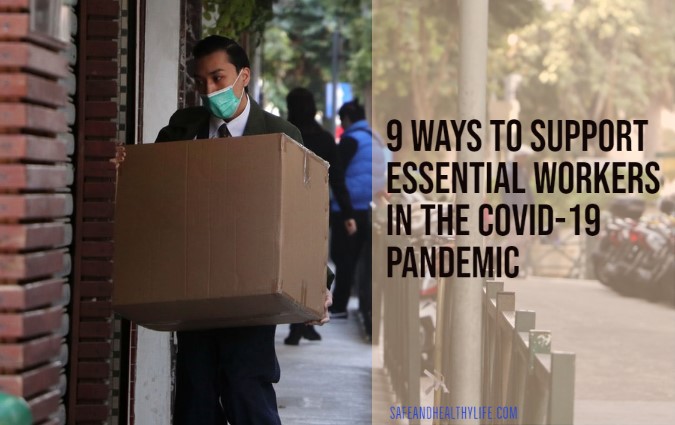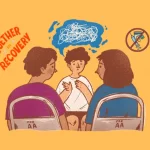
The COVID-19 pandemic is shaping up to be the largest global event of most of our lifetimes. Thanks to the pandemic, many people have been awakened to the fact that we have, perhaps, been taking our so-called “essential workers” for granted.
While the exact definition of “essential” has been the subject of heated debate, most of us can agree that it broadly includes our health workers, sanitation professionals, as well as workers in our food supply logistics chains.
If you want to make a positive difference in the lives of these people who many of us are belatedly starting to appreciate, here are a few simple ways we can do it.
1.) Show your support
Regardless of whether you still need to leave your home for work or have been one of the lucky few to be able to work from home, it’s clear that symbols still matter.
Wearing a DIY t-shirt or wristband that expresses support for essential workers will not go unnoticed on your next supply run or Zoom meeting.
Silicone wristbands are also affordable and easily sanitized, so they can be given away to anyone who wants one. Check out custom awareness wristband colors and specs here.
2.) Think beyond the pandemic
Regardless of where you stand, the COVID-19 pandemic has shown that we should rethink what kind of work is and isn’t “essential”.
While we will get through the pandemic mostly fine, it’s clear that we may have to work together to change things so that our essential workers no longer need to be put at an unnecessary risk the next time the unthinkable happens.
3.) Stay at home
While we could still leave our homes for supply runs or to get some fresh air, it’s clear that most essential workers would rather that we don’t do that.
You can do your part to reduce the risk to essential workers and the public at large by exercising at home and having your supplies delivered instead.
4.) Continue practicing good hygiene
Good hygiene is going to be just as important in the post-pandemic world as it was during its height. “Common” illnesses such as the flu and hepatitis are still very real dangers that can be almost as dangerous as the coronavirus if you aren’t armed with the right knowledge.
You can reduce risks and the resulting strain on the healthcare system by continuing to practice good sanitation and hygiene continuously.
This includes frequent hand washing, wearing protective nitrile gloves when cleaning and handling waste products, and taking a shower before and after going out. These simple actions can help curb the spread of the virus and help keep you and essentials workers safe.
5.) Avoid spreading misinformation or sensationalized news
Some media companies and influencers rely on riled-up followers for clicks, interaction, and ad revenue. While this isn’t necessarily a bad thing by itself, misinformation has become rife and lives may have already been lost because of it.
Misinformation has also led to anxiety, depression, and panic-buying, the last of which has made it difficult for the most affected by the pandemic to get supplies.
Avoid adding to an already serious problem by limiting your social media shares regarding the pandemic.
6.) Learn what you can about COVID-19 from vetted sources
Use only trusted sources for learning about the coronavirus. The CDC, as well as your state public health agencies, should have plenty of information on best practices for dealing with COVID-19 as well as other easily-transmitted diseases.
Be skeptical about any news site’s information unless they show that the information comes from trusted sources. Disregard any social media share that fails to include context, sources, or reasonable courses of action as well.
7.) Help out people who are adversely impacted
While we are all feeling the effects of the pandemic, we’re not all affected to the same degree. Thanks in part to the pandemic, we are now about to experience the worst unemployment and underemployment since the depression.
It’s time to offer what we can to those who are in need. This makes sense not just because it’s the right thing to do, but because the resulting unemployment and lack of opportunities may lead to other social and health issues that will further complicate the lives of our essential workers as well.
See if you can send needed supplies to neighbors and other people in your community. Your example matters and can help kick off a spirit of giving and solidarity in these trying times.
8.) Stop hoarding essential supplies
Personal protective equipment, hand sanitizer, toilet paper, and other supplies are also needed by essential workers.
Chances are, they need them more than you do. There are other ways to reduce your risk of illness that don’t necessitate you having these items, so don’t take more than you need.
9.) Work to improve the lives of essential workers
If you truly believe in the work done by our essential workers, it’s easy to see that we should strive to improve their working conditions regardless of whether or not there is a pandemic.
See if you can donate to charities, political action committees, grassroots movements, and any other group that champions the welfare of essential workers.
When choosing a group to support, be sure to act according to your conscience, and not to the pressures of peers and family members.
Bonus: Support local businesses
Collectively, small businesses are the largest employers in the country. Being the worst hit by the pandemic, communities that lose large numbers of these businesses not only lose out economically but also lose a part of their identity.
By continuing to patronize local businesses when we can, in a safe fashion, we can offset some of the worst economic and societal consequences of COVID-19.
How else can we support the people who are keeping us safe, comfortable, and healthy in this pandemic? Comment below or send us an email. We’d love to hear from you.
About The Author:
Carla Smith is the founder of Safe and Healthy Life. Her main objective is to provide informative articles, reviews, and analyses of health & fitness topics to her readers that help them to make their life easier and happier. Connect with her on Twitter.




